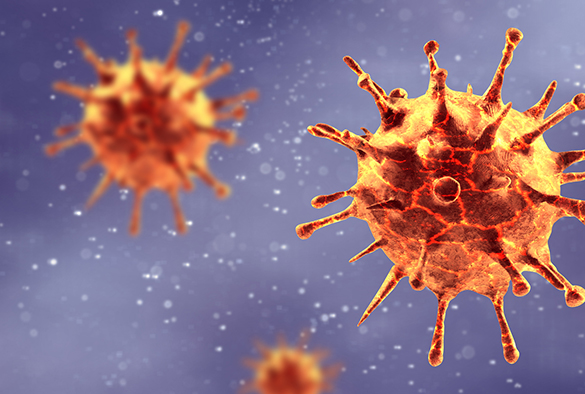
New research has found that the use of non-invasive breathing support to treat moderate to severe COVID-19 infection, isn't linked to a heightened infection risk, as currently thought.
The study, involving University of Liverpool researchers, shows that the use of non-invasive breathing support, commonly known as continuous positive airways pressure (CPAP) and high-flow nasal oxygen (HFNO), produced little measurable air or surface viral contamination, and not more than simple oxygen therapy.
CPAP delivers a steady level of pressurised air and oxygen through a face mask to assist breathing; HFNO delivers oxygen at high flow rate through two small tubes in the nose. Both CPAP and HFNO have been thought to be 'aerosol generating procedures' which expose healthcare staff and other patients to a heightened infection rate. CPAP and HFNO have been thought to generate particles containing virus capable of contaminating the air and surfaces nearby, necessitating additional infection control precautions such as segregating patients and wearing protective gear to prevent the risk of aerosol transmission.
Researcher Professor Danny McAuley, Professor at Queen's University Belfast and Consultant in Intensive Care Medicine at the Royal Victoria Hospital, said: "Our findings show that the non-invasive breathing support methods do not pose a higher risk of transmitting infection, which has significant implications for the management of the patients."
"If there isn't a higher risk of infection transmission, current practices may be over cautious measures for certain settings, for example preventing relatives visiting the sickest patients, whilst underestimating the risk in other settings, such as coughing patients with early infection on general wards."
Professor Calum Semple, co-investigator and Chief Investigator of the ISARIC Coronavirus Clinical Characterisation Consortium said: "This paper adds to the evidence that infection prevention control for COVID-19 should focus on the patient and place in terms of their infectiousness and the ventilation of their environment, rather than solely the procedures and levels of care that they receive."
The research involved 30 patients with moderate to severe COVID-19 across three hospitals in the UK. The patients were divided into three groups of 10 and given either supplemental oxygen, CPAP, or HFNO to compare the amount of air and surface environmental contamination with SARS-CoV-2.
Each patient was swabbed for SARS-CoV-2 and had three air and three surface samples collected from the immediate vicinity where healthcare workers provide care. The presence of viral RNA was detected by PCR targeting two viral genes, and positive or suspected-positive samples were then cultured for any demonstration of viable virus.
Overall, 21 (70%) patients tested positive for SARS-CoV-2 by PCR nasopharyngeal swab at the time of assessment. But only 4 out of 90 (4%) air samples were PCR positive.
Neither the use of CPAP nor HFNO nor coughing were associated with significantly more environmental contamination than supplemental oxygen use. Of the total of 51 positive or suspected-positive samples by viral PCR detection, only one sample from the nasopharynx of an HFNO patient was shown as biologically viable in cell culture assay.
The study, published in Thorax and funded by the National Institute for Health Research (NIHR) and the Medical Research Council, has prompted the researchers to call for a thorough reassessment of the infection control measures deployed for the non-invasive ventilation support methods.
Professor McAuley added: "CPAP is being adopted into clinical care pathways for appropriate hospital admissions across all NHS hospitals. It is timely that we can now demonstrate that CPAP doesn't put others at any higher risk when treating the patient."
The research team included Queen's University Belfast, University Hospitals Birmingham, University of Birmingham, University of Liverpool and University of Edinburgh.
The researchers conclude: "The evolving evidence from hospitalised patients with SARS-CoV-2 infection and the risks of occupational/nosocomial exposure should prompt an evidence-based reassessment of infection prevention and control measures for non-invasive respiratory support treatments that are currently considered 'aerosol generating procedures."
The full article is available here: https://thorax.bmj.com/content/early/2021/11/01/thoraxjnl-2021-218035






